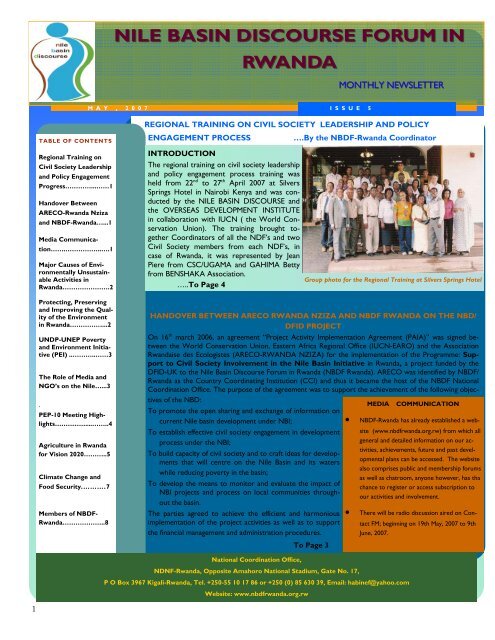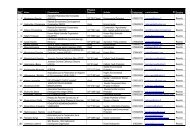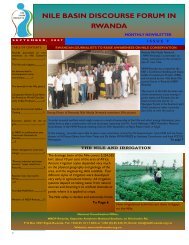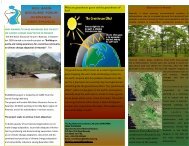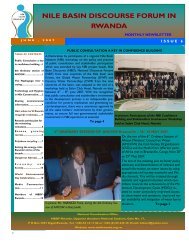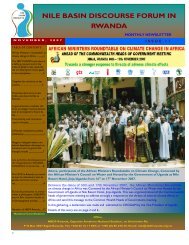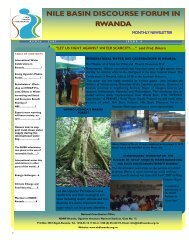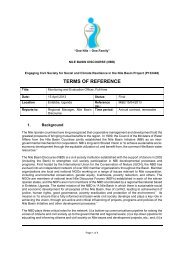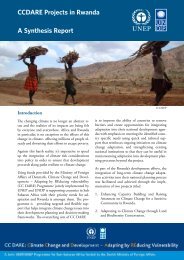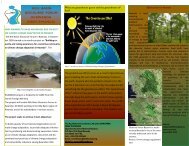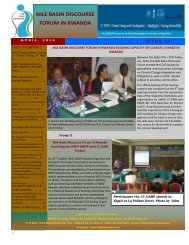5. Newsletter Vol. 5 - NBDF Rwanda
5. Newsletter Vol. 5 - NBDF Rwanda
5. Newsletter Vol. 5 - NBDF Rwanda
You also want an ePaper? Increase the reach of your titles
YUMPU automatically turns print PDFs into web optimized ePapers that Google loves.
NILE BASIN DISCOURSE FORUM IN<br />
RWANDA<br />
MONTHLY NEWSLETTER<br />
M A Y , 2 0 0 7 I S S U E 5<br />
TABLE OF CONTENTS<br />
Regional Training on<br />
Civil Society Leadership<br />
and Policy Engagement<br />
Progress…………...……1<br />
Handover Between<br />
ARECO-<strong>Rwanda</strong> Nziza<br />
and <strong>NBDF</strong>-<strong>Rwanda</strong>…...1<br />
Media Communication…….……………..….1<br />
Major Causes of Environmentally<br />
Unsustainable<br />
Activities in<br />
<strong>Rwanda</strong>………………….2<br />
Protecting, Preserving<br />
and Improving the Quality<br />
of the Environment<br />
in <strong>Rwanda</strong>……………...2<br />
UNDP-UNEP Poverty<br />
and Environment Initiative<br />
(PEI) ..………..……3<br />
The Role of Media and<br />
NGO’s on the Nile…...3<br />
.<br />
PEP-10 Meeting Highlights………..….....……..4<br />
Agriculture in <strong>Rwanda</strong><br />
for Vision 2020………..5<br />
Climate Change and<br />
Food Security.……….7<br />
Members of <strong>NBDF</strong>-<br />
<strong>Rwanda</strong>………………..8<br />
REGIONAL TRAINING ON CIVIL SOCIETY LEADERSHIP AND POLICY<br />
ENGAGEMENT PROCESS<br />
….By the <strong>NBDF</strong>-<strong>Rwanda</strong> Coordinator<br />
INTRODUCTION<br />
The regional training on civil society leadership<br />
and policy engagement process training was<br />
held from 22 nd to 27 th April 2007 at Silvers<br />
Springs Hotel in Nairobi Kenya and was conducted<br />
by the NILE BASIN DISCOURSE and<br />
the OVERSEAS DEVELOPMENT INSTITUTE<br />
in collaboration with IUCN ( the World Conservation<br />
Union). The training brought together<br />
Coordinators of all the NDF’s and two<br />
Civil Society members from each NDF’s, in<br />
case of <strong>Rwanda</strong>, it was represented by Jean<br />
Piere from CSC/UGAMA and GAHIMA Betty<br />
from BENSHAKA Association.<br />
…..To Page 4<br />
To establish effective civil society engagement in development<br />
process under the NBI;<br />
To build capacity of civil society and to craft ideas for developments<br />
that will centre on the Nile Basin and its waters<br />
while reducing poverty in the basin;<br />
To develop the means to monitor and evaluate the impact of<br />
NBI projects and process on local communities throughout<br />
the basin.<br />
The parties agreed to achieve the efficient and harmonious<br />
implementation of the project activities as well as to support<br />
the financial management and administration procedures.<br />
Group photo for the Regional Training at Silvers Springs Hotel<br />
To Page 3<br />
HANDOVER BETWEEN ARECO RWANDA NZIZA AND <strong>NBDF</strong> RWANDA ON THE NBD/<br />
DFID PROJECT<br />
On 16 th march 2006, an agreement “Project Activity Implementation Agreement (PAIA)” was signed between<br />
the World Conservation Union, Eastern Africa Regional Office (IUCN-EARO) and the Association<br />
<strong>Rwanda</strong>ise des Ecologistes (ARECO-RWANDA NZIZA) for the implementation of the Programme: Support<br />
to Civil Society Involvement in the Nile Basin Initiative in <strong>Rwanda</strong>, a project funded by the<br />
DFID-UK to the Nile Basin Discourse Forum in <strong>Rwanda</strong> (<strong>NBDF</strong> <strong>Rwanda</strong>). ARECO was identified by <strong>NBDF</strong>/<br />
<strong>Rwanda</strong> as the Country Coordinating Institution (CCI) and thus it became the host of the <strong>NBDF</strong> National<br />
Coordination Office. The purpose of the agreement was to support the achievement of the following objectives<br />
of the NBD:<br />
MEDIA COMMUNICATION<br />
To promote the open sharing and exchange of information on<br />
current Nile basin development under NBI;<br />
• <strong>NBDF</strong>-<strong>Rwanda</strong> has already established a website<br />
(www.nbdfrwanda.org.rw) from which all<br />
general and detailed information on our activities,<br />
achievements, future and past developmental<br />
plans can be accessed. The website<br />
also comprises public and membership forums<br />
as well as chatroom, anyone however, has tha<br />
chance to register or access subscription to<br />
our activities and involvement.<br />
• There will be radio discussion aired on Contact<br />
FM; beginning on 19th May, 2007 to 9th<br />
June, 2007.<br />
National Coordination Office,<br />
NDNF-<strong>Rwanda</strong>, Opposite Amahoro National Stadium, Gate No. 17,<br />
P O Box 3967 Kigali-<strong>Rwanda</strong>, Tel. +250-55 10 17 86 or +250 (0) 85 630 39, Email: habinef@yahoo.com<br />
Website: www.nbdfrwanda.org.rw<br />
1
2<br />
MAJOR CAUSE OF ENVIRONMENTALLY UNSUSTAIBALE ACTIVITIES IN RWANDA<br />
By John Gakumba<br />
According to Bernard D. GOLDSTEIN, the term "sustainable development" was popularized in 1987 by the World Commission on<br />
Environment and Development. It refers to a systematic approach to achieving human development in a way that sustains planetary<br />
resources, based on the recognition that human consumption is occurring at a rate that is beyond<br />
Earth's capacity to support it. Population growth and the developmental pressures<br />
spawned by an unequal distribution of wealth are two major driving forces that are altering the<br />
planet in ways that threaten the long-term health of humans and other species on the planet.<br />
Poverty and environmental degradation affect each other. Poverty forces poor farmers to engage<br />
in environmentally unsustainable practices like deforestation and overgrazing. It is suggested<br />
that land (as a natural resource) and poverty are linked to structural factors that have<br />
evolved over several decades. They include an interlinkage between land use and environmental<br />
degradation. Researchers in<br />
<strong>Rwanda</strong> recognize that poverty in<br />
<strong>Rwanda</strong> is closely related to series<br />
of interconnected issues and in particular<br />
land, environmental degradation and low resources. On a<br />
broader perspective, poverty as a problem goes beyond the lack of basic<br />
needs like food, clothing and shelter, to include lack or denial of social<br />
needs as well.<br />
<strong>Rwanda</strong>’s environment has been further destroyed through the search<br />
for agricultural land and for settlement. These relate to poverty as they<br />
closely link to environment through the search for basic needs like food<br />
and shelter. Poverty and its relationship with the environment<br />
show that environment is a cross cutting issue.<br />
In Picture: Since 1980, Mukura forest reserve lost about 50% of it’s<br />
superficies due to human activities. Could this be Climate Change<br />
or Biodiversity?!?! What could be the solution to this?<br />
PROTECTING, PRESERVING AND IMPROVING THE QUALITY OF THE ENVIRONMENT IN RWANDA<br />
<strong>Rwanda</strong> like any other country of the world is embarking on the actions to protect, preserve and improve the quality of the<br />
environment. The protection and safeguarding of environment has become an important<br />
concern in <strong>Rwanda</strong> as the country’s economy depends on agriculture as a result creating a<br />
need to safeguard land resources. When the land is degraded the economy is adversely affected.<br />
However, concern for the environmental management in most cases occurs late after<br />
the quality has been lowered. <strong>Rwanda</strong> ’s key environmental challenges concern deforestation,<br />
soil erosion, over grazing, misuse of wetlands<br />
and poor waste management associated with<br />
negative impacts on human health thus a hindrance<br />
to sustainable development of the country.<br />
The situation worsened after the 1994 genocide,<br />
which left the country in shambles.<br />
Returnees from exile were in dire need of settlements,<br />
leading to clearing of forests and wetlands<br />
in search for agricultural land and shelter. Such<br />
high human needs resulted to environmental degradation.<br />
The state of affairs has led to the reform of environmental policies, legal and institutional<br />
framework aimed at safeguarding environment, an indication of Government concern to<br />
awaken the minds of the public to the dangers of environmental<br />
degradation. This will promote and enhance the well being of the present and future generations.<br />
<strong>Rwanda</strong> just like any developing country still faces the problem of poverty and this pollutes the environment, creating the<br />
environmental stress in a different way. Those who are poor and hungry will often destroy their immediate environment in order<br />
to survive. They will cut down forests, their livestock will overgraze grasslands, they will crowd in congested cities and they will<br />
over use marginal land.<br />
Realizing the magnitude of the problem, the Government of <strong>Rwanda</strong> has got on reforming strong environmental policy, legal and<br />
institutional instruments to safeguard the present and future generation to ensure sustainable development basing on Vision 2020.<br />
www.rwandagateway.org
UNDP-UNEP Poverty and Environment Initiative (PEI)<br />
Overall goal: To contribute to poverty reduction and improved well-being of poor and vulnerable groups through mainstreaming<br />
of environment into national development processes<br />
Objectives at country level:<br />
• Inclusion of environmental sustainability as a central objective in national development strategies, such as poverty reduction strategy<br />
papers (PRSPs), MDG implementation plans or equivalents;<br />
• Increasing national budget allocations towards the environment;<br />
• Building the long-term capacity of the government to integrate environmental concerns into the design and implementation of<br />
development plans.<br />
Basic facts of the PEI in <strong>Rwanda</strong><br />
• The PEI in <strong>Rwanda</strong> was introduced at a national workshop in February 200<strong>5.</strong><br />
• <strong>Rwanda</strong> PEI Phase I was, subsequently, developed jointly by the Government of <strong>Rwanda</strong> (GoR), UNEP and UNDP through a<br />
Task Team and in consultation with a range of other national stakeholders and international development partners.<br />
• The Task Team includes members from the Ministry of Environment, Lands, Water, Forestry and Mines (MINITERE), <strong>Rwanda</strong><br />
Environment Management Authority (REMA), Ministry of Finance and Economic Planning (MINECOFIN), Ministry of Local<br />
Governance (MINALOC), Ministry of Agriculture (MINAGRI) and Ministry of Infrastructure (MININFRA).<br />
• <strong>Rwanda</strong> PEI has a two-phased approach. The main purpose of the first phase is to ensure the integration of environment into<br />
<strong>Rwanda</strong>’s new PRSP, the Economic Development and Poverty Reduction Strategy (EDPRS). Phase II will be articulated<br />
around <strong>Rwanda</strong>’s medium term needs, namely capacity building for sound environmental management at the local, district,<br />
and national level, in collaboration with other ongoing initiatives to enable the implementation of the EDPRS and its expected<br />
environmental commitments.<br />
• Started in December 2005, Phase I is designed to run parallel to the EDPRS process which is currently scheduled to end in<br />
May 2007.<br />
• The project is executed by GoR through MINITERE and implemented by REMA with direct support from UNDP and UNEP.<br />
A Project Management Unit, composed of an International Technical Advisor and a National Project Manager, assists in<br />
the delivery of PEI activities under the overall guidance of the Director-General of REMA who acts as Project Coordinator.<br />
• Donors: Government of Belgium and Government of Norway (through UNEP), UNDP-<strong>Rwanda</strong> and UNDP HQ. Funds are<br />
distributed through UNDP-<strong>Rwanda</strong>. Funds from the Government of Ireland have been secured for PEI phase II. As part of<br />
the National Execution (NEX) modality of UNDP operational funds are being transferred on a quarterly basis from UNDP<br />
to REMA.<br />
• Total budget (for Phase I): 610,000 USD. To Page 6<br />
ARECO-<strong>Rwanda</strong> Nziza and <strong>NBDF</strong>-<br />
<strong>Rwanda</strong> Handover<br />
…...From Page 1<br />
ARECO was therefore instructed by <strong>NBDF</strong>/<br />
<strong>Rwanda</strong> to receive funds from IUCN-EARO on<br />
behalf of itself in regard to the NBD.<br />
Within a period of 6 months, ARECO collaborated<br />
for the implementation of the first milestone which<br />
was Planning and Development of Nile Discourse<br />
Forum in <strong>Rwanda</strong>.<br />
On 17 th November 2006, a 6 months Addendum<br />
was signed to extend the agreement in order to<br />
support the Milestone 2 implementation<br />
“Knowledge and communication”.<br />
Implementation of activities, financial<br />
management and administration Procedures<br />
For each milestone funds were transferred by<br />
IUCN and managed by ARECO into two instalments<br />
each taking 3 months.<br />
Monthly technical and financial progress and final<br />
reports were submitted to the Discourse Desk<br />
and IUCN for each transfer and after completion<br />
of milestone implementation.<br />
The Role of Media and NGO’s on the Nile<br />
By Frank Habineza National Coordinator<strong>NBDF</strong> <strong>Rwanda</strong><br />
An organized society distinguishes itself by its concern to communicate. Nowadays,<br />
information is recognized as a human right at the same level as the right for<br />
life, food, education, job, health and so on. The citizens of the Nile Basin, have the<br />
right to know what the Nile Basin Initiative has in store for them and also know<br />
which role they can play. All this can’t happen if the media doesn’t intervene. Nile<br />
Basin Initiative has many good projects which the <strong>Rwanda</strong>n people are not aware<br />
of and thus they can’t participate if they are not informed. This paradox calls for<br />
Media intervention.<br />
Our role as Media houses and NGOs is to try to solve these paradoxes we<br />
are daily facing in the region of Equatorial Lakes…….HABINEZA Frank.<br />
(photo to be included for the media groups attending<br />
the workshop)<br />
3
REGIONAL TRAINING ON CIVIL SOCIETY LEADERSHIP AND POLICY ENGAGEMENT PROCESS .<br />
..from Pg 1<br />
Alan Nicol gave introductory remarks as well as a presentation in which he highlighted the increasing importance of the Nile Basin<br />
Discourse (NBD) with regard to policy engagement even at the international level. He posited that the work relationship of the<br />
desk and National Discourse Forums (NDFs) is vital to the realisation of the objectives of the NBD - which prompt/inform policy<br />
debates on the Nile basin, and for which a strategic approach is required in order to facilitate interaction with and influence governments<br />
(of the riparian countries). He further outlined two key objectives that underscored these issues. These are:<br />
Strengthen understanding of the policy environment surrounding the Nile basin and the Nile Basin Initiative.<br />
Need to develop policy tools to map the engagement of policy. For this, there is further need to:<br />
♦<br />
♦<br />
♦<br />
Draw strategy on how to do so<br />
Focus on broader areas of policy mapping<br />
Identify the particular policy issues/needs and develop specific action plans<br />
To achieve the objectives, Alan outlined a pragmatic approach that examines the policy environment along the regional and local<br />
axis along with the crosscutting sector specific (national and sub-national water policies) and non-sector specific (PRSPs, national<br />
processes) issues.<br />
OUTCOME OF THE TRAINING PROGRAMME<br />
In general, following the opening presentation, participants had an opportunity to express what they hoped to get out of this second<br />
part of the workshop. The popular expectations were on policymaking and policy engagement strategies with policy makers<br />
and NBD. Other expectations included strategies for engaging in trans-boundary water management initiatives.<br />
But also, a furthered understanding of the Nile Basin Discourse Program and Strategy,<br />
Well developed Activity plans and Budget for the Remaining Milestones<br />
Civil Society Engagement Processes, project management, evaluation and monitoring,<br />
Knowledge on globalisation, gender, ethnicity and ethnic conflicts,<br />
More knowledge on Sustainable development,<br />
Policy influences and processes, tools for policy impact, policy mapping, and policy strategy.<br />
CONCLUSION<br />
Dr. Melaku gave a vote of thanks to all participants, the ODI team and the support staff for their contributions to making the<br />
workshop a success. He felt that the training would help the respective NDFs in adopting various advocacy strategies. Participants<br />
too were grateful for the workshop, which generated interest on possible trans-boundary networking opportunities, in addition to<br />
the take away points on the globalisation theme, undertaking of research and sharing of expertise. They also identified various issues<br />
to advocate for, i.e. gender and water management, energy alternatives (with focus on stemming deforestation), integration of<br />
other disciplines into water resources management, role of the state in engaging civil society (in areas of corruption, nonaccountability,<br />
creating space for civil society, poverty), water and health, HIV/AIDS, population and biodiversity conservation.<br />
PEP-10 Meeting Highlights<br />
The Poverty Environment Partnership's 10th meeting (PEP-10) was held in UN headquarters in Nairobi, Kenya<br />
from 30 January to 01 February 2007. The overall theme for the proceedings was "Country experiences in<br />
mainstreaming environment into national development processes." PEP-10 opened on Tuesday 30<br />
January 2007, with approximately ninety participants in attendance, including representatives from developing<br />
country governments, donor organizations, and international and national NGOs and research institutes. In the<br />
morning, participants heard welcoming addresses by Peter Hazlewood, UNDP, and David Smith, UNEP, who<br />
outlined the agenda and objectives of the meeting. In a video message, Olav Kjørven, Director, UNDP Environment<br />
and Energy Group, highlighted increasing cooperation between UNDP and UNEP in line with the UN<br />
system-wide transformation.<br />
Participants heard presentations on mainstreaming environment into national development processes from:<br />
Ruzika Muheto, National Environment Management Council (NEMC), Tanzania; John Nyangena, Ministry of<br />
Planning and National Development (MPND), Kenya, and Alex Forbes, UNDP; and Alex Mulisa, <strong>Rwanda</strong> Environment<br />
Management Authority (REMA).<br />
Alex Mulisa, <strong>Rwanda</strong> PEI, <strong>Rwanda</strong>, indicated that they conducted an<br />
economic analysis of the cost of environmental degradation.<br />
4
Agriculture in <strong>Rwanda</strong> for Vision 2020<br />
<strong>Rwanda</strong> ’s main aim of the Millenium Development Goals and Vision 2020 is to enable <strong>Rwanda</strong>ns to emerge from underdevelopment<br />
and poverty status by achieving economic growth objectives in combination<br />
with social indicators objectives. One of the key aspects of these goals is to<br />
eradicate extreme poverty and hunger.<br />
It is targeted that by the year 2015, the proportion of people living below the poverty<br />
line shall not exceed 23.8% - a half of the 1990 level.<br />
By the same standards, the proportion of people who suffer from hunger would<br />
also have been halved. Given that AGRICULTURE is the main productive activity<br />
for the majority of <strong>Rwanda</strong>n households employing 88.6% of the working population;<br />
and as always,<br />
dominating the country’s Gross Domestic Product (GDP) at 47% for the year 2002<br />
(Table 1), the attention accorded the development of the agricultural sector cannot<br />
be over-emphasized.<br />
www.rwandagateway.org<br />
Role of media……………………..from page 2<br />
• The coexistence between drastic poverty and under-development of riparian with a high potentiality of sustainable development<br />
within the Nile Basin.<br />
• A deep lack of communication between policy makers, scientists, NGOs and stakeholders.<br />
• We have to explain a lot of questionings, such as the maintenance of the ecosystem or the direct link between the forest<br />
and the permanent presence of water.<br />
• What is easily comprehensive in scientific fora like this workshop is not so easy to explain to people who daily suffer from<br />
hunger, drinking water scarcity and darkness.<br />
• We have to explain the importance of the conservation of nature.<br />
• Our target as communication professionals is local stakeholders, generally rural peasants, illiterate or semi-literate.<br />
• Mr.HABINEZA also noted, public awareness of water sector issues should begin in schools but be emphasised in Rural areas<br />
and then finally to urban areas.<br />
• Young people grow up without necessarily knowing that they take part in the daily life of the Nile Basin through their daily<br />
activities and that this implies a consequent behaviour, thus needs to be addressed<br />
• Media’s role in mobilization for development is interdependent of NGOs’, as media convey the NGOs’ message to the target.<br />
In other words, NGOs cannot succeed in their action if they are not assisted by media.<br />
• In a keynote in Washington DC, November 7, 2002, the World Bank writes "… a free press can reduce poverty and stimulate<br />
the economic development in the poor countries but such an operation depends on the existence of the independence and the quality<br />
of the press, of its ability to reach a large audience".<br />
• On the same chapter, James D. Wolfensohn, Former president of the World Bank writes that "to solve poverty, we must<br />
release the access to information and promote its quality. A population more informed has the capacity to better choose. A free press<br />
is not the prerogative of the only rich countries. It is the heart of an equitable development ".<br />
• These two quotations explain not only the importance of media in the action we have to implement for the development of<br />
the Nile Basin populations but also towards the condition of media in poor countries.<br />
• We are happy to know that this problem of communication is taken in heart by the Nile Basin Initiative in its "Shared Vision<br />
program".<br />
<strong>NBDF</strong>-<strong>Rwanda</strong>, however, announced its intentions on the 25th May, 2007 at Alpha Palace Hotel in Kigali; being to involve and motivate<br />
the media houses in creating an awareness among the masses to combat the poverty and poor livelihood of the riparian<br />
states’ citizens.<br />
Compiled, Designed and Edited by Gakumba John B.W<br />
kistlife@yahoo.com,<br />
cel +250 (0) 8583536<br />
5
UNDP-UNEP Poverty and Environment Initiative (PEI) From Page 3<br />
The context of mainstreaming of environment in <strong>Rwanda</strong><br />
• <strong>Rwanda</strong>’s “Vision 2020” is the country’s overarching national planning and policy framework into which other strategies, plans,<br />
programmes and policies should fit. Developed in 1999, The Vision 2020 document recognizes that the environment cannot<br />
be tackled in isolation. The document states that <strong>Rwanda</strong> will endeavour to “mainstream the environmental aspect in all policies<br />
and programmes of education, sensitization and development and in all the processes of decision-making”.<br />
• <strong>Rwanda</strong>’s first and current PRSP was finalised in November 2001 and endorsed by the World Bank and IMF in July 2002.<br />
• In the development of PRSP I, environment was considered a cross cutting issue but not an independent sector. However, it is<br />
widely agreed that <strong>Rwanda</strong>’s first PRSP did not adequately integrate environmental issues and consequently, the planning<br />
processes did not adequately take into account sustainable natural resource management.<br />
• <strong>Rwanda</strong> is currently developing its second PRSP, the Economic Development and Poverty Reduction Strategy (EDPRS), and it is<br />
now imperative that environment be mainstreamed into this document and its associated budgets.<br />
• Environment has been defined as both an independent sector and a cross-cutting issue in the new EDPRS.<br />
• REMA is chairing the Environment and Land Use Management Sector Working Group (SWG).<br />
• PEI is heavily engaged in the EDPRS process and playing a crucial role in supporting the work of both the Environment and Land<br />
Use Management Sector Working Group (SWG) and the Cross-cutting Issues SWG.<br />
Main activities of <strong>Rwanda</strong> PEI Phase I<br />
• Development of a knowledge base on poverty and environment linkages in <strong>Rwanda</strong> through e.g. an economic analysis of costs<br />
of environmental degradation, identification of poverty-environment-energy linkages, and a pilot integrated ecosystem assessment<br />
(IEA).<br />
• Development of environmental mainstreaming tools for the EDPRS process:<br />
- Guidelines for mainstreaming of environment into the EDPRS and sectoral strategies.<br />
- Guidance brief for inclusion of poverty and environment indicators in EDPRS<br />
• Environment-for-development media events (mainly radio programmes) to sustain the visibility of the mainstreaming agenda and<br />
raise public awareness about poverty and environment linkages.<br />
• Increase stakeholder participation, mainly through a Stakeholder Consultative Group comprising individuals from the private<br />
sector, academia and NGOs.<br />
• Capacity building through training workshops such as integrated ecosystem assessment, poverty-environment (PE) indicator<br />
development and on-the-job training and technical support by the PEI Technical Advisor and National Project Manager.<br />
What has been achieved to date?<br />
• Establishment of a cross-ministerial Task Team and a Stakeholder Consultative Group ensuring effective stakeholder consultation<br />
and strong collaboration between GoR, UNEP and UNDP.<br />
• Environment included as both a cross-cutting issue and an independent sector in the EDPRS. The evidence and advocacy provided<br />
by PEI were instrumental in this accomplishment.<br />
• Compelling advocacy papers, including an analysis of PRSP I and its integration of environment, environmental checklists to<br />
guide integration of environment into sector strategies, various briefing notes to MINECOFIN about the relevance of environment<br />
to national development objectives and guidelines for mainstreaming environment, have been produced and had a<br />
significant impact on the EDPRS process. Most other sectors have already taken on board environmental recommendations<br />
in their sector logframes.<br />
• PEI ensured the participation of environment mainstreaming specialists in the logframe development process conducted by each<br />
sector further facilitating the integration of environment across all sectors.<br />
Lessons learned<br />
• Involvement of key stakeholders from the very start of programme development ensures broad ownership and improves the<br />
efficiency and effectiveness of project implementation.<br />
• It is crucial to clearly demonstrate the links between poverty and environment at the national level in a language familiar to<br />
planners and policymakers. Assessments such as economic analysis of environmental degradation and IEA are essential evidence-based<br />
advocacy tools in convincing policy-makers about the importance and benefits of sustainable natural resource<br />
management.<br />
• It is necessary to provide sustained support over a longer period. PEI-<strong>Rwanda</strong>’s continuous engagement in the EDPRS process<br />
ensures better mainstreaming results by closely monitoring the process and responding to specific needs from the other<br />
sectors pertinent to integration of environment.<br />
• The production of tools such as mainstreaming guidelines, sector specific environmental checklists and P-E indicators provides<br />
concrete guidance to the sectors and relevant ministries and enhances the mainstreaming process.<br />
• An adequately staffed PEI project management unit is crucial for the achievement of the goals.<br />
Way forward<br />
• Continuous support and monitoring of the EDPRS development for environmental mainstreaming until its finalization.<br />
• Development of PEI Phase II to support the implementation of EDPRS and build capacity building for effective and sustainable<br />
management of natural resources in <strong>Rwanda</strong>.<br />
• Support harmonization between UNEP and UNDP procedures to improve collaboration and project implementation.<br />
6<br />
www.unep.org/poverty_environment/PDF_docs/<strong>Rwanda</strong>-country-sheet.pdf
7<br />
Climate Change and Food Security<br />
…...Continuation<br />
By John W.B GAKUMBA (BSc. FST)<br />
In addition, in Rosenzweig et al., Climate Change and Extreme Weather Events; Implications for Food Production, Plant Diseases, and Pests, the authors found that<br />
global food supply may be affected by an increase in extreme weather events and climate variability associated with global warming. Altered weather patterns can<br />
increase crop vulnerabilities to infection, pest infestations, and choking weeds. This will not only decrease yields of crops, but also<br />
force farmers to apply harmful and expensive pesticides and herbicides. The increase in extreme weather events will affect both<br />
developed and developing countries, although developed countries have more resources to deal with vulnerabilities.<br />
Impacts of Climate Change on Food Security<br />
How will climate change alter the ability of the world's growing population to gain access to food? By integrating agricultural and<br />
socio-economic models, we can begin to predict if there will be an increase in hunger and famine as a result of global warming.<br />
Food security has been defined as "access by all people at all times to enough food for an active, healthy life" (World Bank,<br />
1986). The World Food Summit, convened in 1996 and in 2002 by the Food and Agricultural Organization of the United Nations<br />
(FAO) in Rome, highlighted the basic right of all people to an adequate diet and need for concerted action among all countries to<br />
achieve this goal in a sustainable manner. How vulnerable households, regions and countries are to climate change's impacts on agriculture<br />
will depend on their access to land, water, and government support and action.<br />
The World Food Trade Model, designated as the Basic Linked System (BLS), links countries through trade, world market prices, and financial power. The BLS estimates<br />
that in 1980, there were about 500 million people at risk of hunger in the developing world (excluding China). Without climate change, the number of people<br />
expected to be at risk of hunger in 2060 has been estimated at ~640 million. This is marked decrease from 23% of the population of developing countries to 6%<br />
(excluding China).<br />
However, with unmitigated climate change, declines in yields in low-latitude regions (where many developing countries are located) are projected to require that<br />
net imports of cereals increase. Higher grain prices will affect the number of people at risk of hunger. The number of hungry people in developing countries will<br />
increase by ~1% for every 2-2.5% increase in prices. This means that the number of people at risk of hunger grows by 10-60% in the<br />
scenarios tested, resulting an estimated increase of between 60 to 350 million people in this condition (Rosenzweig and Parry, 1994).<br />
Mitigation and Adaptation<br />
Reducing Carbon Emissions<br />
One of the ways to prevent the effects of global warming is to decrease the amount of carbon dioxide and other greenhouse gases<br />
into the atmosphere. The Kyoto Protocol is a document that came out of the U.N. sponsored Earth Summit in Rio de Janeiro in<br />
1992. This agreement, which has been ratified by over 100 countries, seeks to limit the amount of CO 2 emitted into the atmosphere to 1990 levels. However, the<br />
United States, which emits 25% of all global greenhouse gases, has not yet ratified the Kyoto Protocol.<br />
Adaptation to Global Warming<br />
Even if all CO 2 emissions stopped at this moment, the amount of CO 2 already emitted into the atmosphere will result in an enhanced greenhouse effect for the next<br />
50 years. Thus, people will need to adapt to the effects of climate change.<br />
Adaptation can be defined as "any action that seeks to reduce the negative effects, or to capitalize on the positive effects, of climate change" (Riebsame et al.<br />
1995). Adaptive actions may be either anticipatory or reactive in nature. An example of an anticipatory adjustment is the development of heat- and droughttolerant<br />
crop varieties.<br />
The levels of adaptation undertaken by a region may have significant effects on how climate change will affect agriculture in that<br />
area. In Rosenzweig and Parry (1994) levels of adaptation were grouped into two levels.<br />
Level 1 adaptations include:<br />
• shifts in planting date (±1 month) that do not imply major changes in crop calendar,<br />
• additional application of irrigation water to crops already under irrigation,<br />
• changes in crop variety to currently available varieties more adapted to the altered climate.<br />
Level 2 adaptations imply more substantial change to agricultural systems, possibly requiring resources beyond the farmers' means,<br />
including:<br />
• investment in regional and national agricultural infrastructure<br />
• policy changes at the regional and national level<br />
Level 2 represents a fairly optimistic assessment of world agriculture's response to changed climate conditions.<br />
Adaptation, especially Level 2 adaptation, may significantly reduce the effect of climate change on agriculture and the number of people at risk of hunger . However,<br />
adaptation in developing countries, although it does reduce the negative effect of global warming, does not completely eliminate the potential increase in hunger .<br />
Conclusion<br />
CLIMATE CHANGE SERIES; 4<br />
In conclusion, global warming may result in detrimental effects on food supply and security, especially in developing countries. Even if developing countries adapt to<br />
climate change, they will not be able to completely avoid the problems associated with climate change. Furthermore, these harmful outcomes of climate change in<br />
developing countries and potentially positive outcomes in developed countries will probably increase the gap in wealth, access to food, and health between rich and<br />
poor countries. This will affect the worldwide economy as emerging trade-partners are lost, hunger increases, and refugees leave regions harmed by global warming<br />
in search of food and resources.
MEMBERS OF <strong>NBDF</strong>-RWANDA<br />
N° ORGANISATION CONTACT PERSON ADDRESS MAIN INTERVENTION FOCUS<br />
1 ARECO-RWANDA NZIZA (Association <strong>Rwanda</strong>ise des Ecolo- MUKAKAMARI Dancilla e-mail : Environmental Protection<br />
2 ARJE (Association <strong>Rwanda</strong>ise des Journalistes Environnementaux)<br />
3 (RECOR) <strong>Rwanda</strong> Environmental Conservation Organisation SEHENE Jean Chrysostome<br />
UWIMANA Albertine rwejass@yahoo.com Promotion of Environmental Reporting<br />
in different media in <strong>Rwanda</strong><br />
rwc@planet-save.com<br />
Conservation, Agroforestry, ecotourism<br />
and Environmental education<br />
4 SERUKA ASBL KAYITEGEYE Athanasie seruka@rwanda1.com<br />
Gender Environmental Protection<br />
5 IMBARAGA SATP Environmental Trainer Organic Farming Mrs. SANYU Régina sanyuregina@yahoo.com Agriculture Parcs protection<br />
6 URUMURI RW’URUKUNDO NDIRIMA Denis Tél/Fax: 575668<br />
Rural Development<br />
7 SOLIDAIRES BENURUGWIRO MUKABINAMA Edith solidaires_b@yahoo.fr Gender, Development, Micro projects<br />
for women<br />
8 JOC/F (Jeunesse OuvriХre Catholique for Girls) NKUNDIZANA Domina nkundizana@hotmail.com Catholic Youth Promotion<br />
9 ISUKU ASBL HABIYAREMYE J.B<br />
isuku_rwanda@yahoo.co<br />
Hygiene, Environmental Protection<br />
10 ARDI RUDASINGWA Emmanuel Tél: 08571048 Development, Environmental Protection<br />
11 FRSP (Federation <strong>Rwanda</strong>ise du Secteur Privé) BITWAYIKI Eugène frsp@rwanda1.com Private Sector Federation<br />
12 <strong>Rwanda</strong> Rain Water Harvesting Association KABALISA Vincent nilerwa@yahoo.fr Rain water harvesting<br />
13 RDO <strong>Rwanda</strong> Development Organisation BAHORANA Augustin 08594464 Rural development<br />
14 Fondation Nzambazamariya Vénéranda MUKANTABANA Crescence mukacresc@yahoo.fr<br />
Gender<br />
Child Rights Protection<br />
15 ACNR (Association pour la Conservation de la Nature au BIZIMANA Innocent Inbizimana@avu.org Nature Conservation<br />
16 ARDHO (Association <strong>Rwanda</strong>ise pour la Defense des droits de l SAFARI Emmanuel manusafari@yahoo.com Human Rights<br />
17 CLADHO ( Human Rights Umbrella Organisation) UWANYIRIGIRA Agnes 572740 Human rights umbralla organisation<br />
18 JOC (Jeunesse ouvriere Catholique Garcons) KALISA Ernest kalisajoc@yahoo.com Catholic Youth Promotion<br />
19 UGAMA/CSC SIMPUNGA Innocent simpunga@yahoo.fr Capacity building for local CSOs,<br />
tranining<br />
20 PRO-FEMMES/TH Suzanne RUBONEKA Profemme@rwanda1.com<br />
21 AREDI (Association <strong>Rwanda</strong>ise pour l Environnement et le<br />
Developpement Intégré)<br />
SIKUBWABO Adélard<br />
aredi@rwanda1.com<br />
tekesik@hotmail.com<br />
Gender, Umbrella for Women<br />
Associations<br />
Environmental protection and<br />
Integrated Development<br />
22 COSYLI (Conseil des Syndicats Libres au <strong>Rwanda</strong>) TWAYIGIRA Jean Léonard<br />
23 CCOAIB (Conseil de Concertation des Organisations d Appui<br />
aux Initiatives de Base)<br />
Tél : 522585, 08479390<br />
Workers Union<br />
Prisca ccoaib@rwanda1.com Dialogue, capacity building and exchange<br />
for local initiatives<br />
24 Réseau des femmes UWIMANA Bibiane<br />
Gender Promotion of Rural Women in<br />
refemme@rwanda1.com <strong>Rwanda</strong><br />
25 BENISHYAKA GAHIMA Betty benasoc@rwanda1.com Gender Support to Women and vulnerable<br />
Children<br />
26 ARJ (Association <strong>Rwanda</strong>ise des Journalistes) SEMUKANYA Martin<br />
msemukanya@yahoo.fr<br />
27 INADES FORMATION KABAYIZA Eustache 584713 Rural development<br />
Promotion of professional Journalism in<br />
<strong>Rwanda</strong><br />
28 (RWEPI) Rwandese Health Environment Project Innitiative James RUBAKISIBO Tel: 08856116 Environmental health and protection<br />
8<br />
29 CAURWA (Conseil des Autoctones au <strong>Rwanda</strong>) SEBISHWI Juvénal<br />
juvesebi@yahoo.fr<br />
Promotion of Indigenous People


